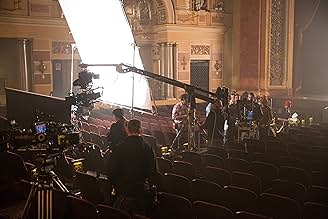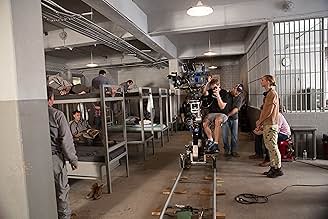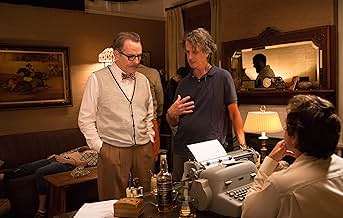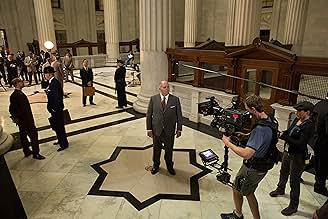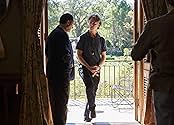IMDb RATING
7.4/10
86K
YOUR RATING
In 1947, Dalton Trumbo was Hollywood's top screenwriter, until he and other artists were jailed and blacklisted for their political beliefs.In 1947, Dalton Trumbo was Hollywood's top screenwriter, until he and other artists were jailed and blacklisted for their political beliefs.In 1947, Dalton Trumbo was Hollywood's top screenwriter, until he and other artists were jailed and blacklisted for their political beliefs.
- Nominated for 1 Oscar
- 8 wins & 45 nominations total
Toby Nichols
- Chris Trumbo (age 6-10)
- (as Tobias McDowell Nichols)
- Director
- Writers
- All cast & crew
- Production, box office & more at IMDbPro
Featured reviews
I have seen so many documentaries about this era. The Hollywood blacklist, McCarthyism.
However, this takes a fresh, personal look at what happened. It shows how folks actually handled this, rather than just the circumstances of the time and newsreels of Congress hearings. How did they do it? This shows the how and when, the risks. Of course, Trumbo captures the full story of the persecution.
Stay to the very end of the film, stay for the credits as some of the clips they show are so meaningful.
I don't know if Trumbo was the person shown in the film, but if he was, he was an American hero. I think films like this represent the spirit, the best or worst of the spirit of what happened.
Trumbo wasn't just a hero from the look of it, he was also a survivor who made his way through the worst of it and came out on the other side.
However, this takes a fresh, personal look at what happened. It shows how folks actually handled this, rather than just the circumstances of the time and newsreels of Congress hearings. How did they do it? This shows the how and when, the risks. Of course, Trumbo captures the full story of the persecution.
Stay to the very end of the film, stay for the credits as some of the clips they show are so meaningful.
I don't know if Trumbo was the person shown in the film, but if he was, he was an American hero. I think films like this represent the spirit, the best or worst of the spirit of what happened.
Trumbo wasn't just a hero from the look of it, he was also a survivor who made his way through the worst of it and came out on the other side.
I happened only 70 years ago and so many young people have never even heard about it. How can it be? And, how dangerous. Not to know will always put you at a disadvantage, oh yes, sooner or later. Trumbo feels like a story set in a totalitarian Country and yet...The spread of fear is a powerful weapon used by self-aggrandizing sociopaths. Joe McCarthy's success is still a mystery to me and Trumbo proves, in the most riveting way, how easily we can fall in that trap. Bryan Cranston is simply, sensational portraying a true American in all its contradictions. I never really thought of the actual degradation Trumbo and the other blacklisted writers went through until I saw it in Bryan Cranston's face. David James Elliott portrayal of John Wayne is chilling and disturbing, specially because id true. I've heard from people who knew him, what a nice man Duke was and yet...Helen Mirren as Hedda Hopper was another chilling and unexpected portrait of utter ignorance. I've only recently found out that she was behind the forces that wanted Charles Chaplin out of the Country. Congratulations to director Jay Roach and to a spectacular cast. Let's hope everyone pays attention.
This movie is important. It tells the story of the struggles faced by the people who sought to have a differing political view in the 1950s and 60s. Their decision to think differently left them facing prejudice and hatred in America. This is the focus of this movie.
The story follow Dalton Trumbo, portrayed by Brian Cranston,a successful screenwriter in Hollywood in the 1950s. Cranston carries this movie on the shoulders of his performance. It is truly phenomenal how he brings such life and energy to this character. He captured my attention anytime he was on-screen and is without a doubt one of the major reasons you should see this movie.If you are a fan of any of Cranstons previous works you should love this movie for that reason alone. Cranston was nominated for an Oscar for this performance, a nomination I believe was well deserved.
The movie is of course based on a true story. while I cannot attest to the validity of the facts, I can confidently say that anyone interested in this period of history will find this movie much more enjoyable then reading a Wikipedia page.
Overall I give Trumbo 8/10 for its compelling plot and excellent performances. i would highly recommend it.
The story follow Dalton Trumbo, portrayed by Brian Cranston,a successful screenwriter in Hollywood in the 1950s. Cranston carries this movie on the shoulders of his performance. It is truly phenomenal how he brings such life and energy to this character. He captured my attention anytime he was on-screen and is without a doubt one of the major reasons you should see this movie.If you are a fan of any of Cranstons previous works you should love this movie for that reason alone. Cranston was nominated for an Oscar for this performance, a nomination I believe was well deserved.
The movie is of course based on a true story. while I cannot attest to the validity of the facts, I can confidently say that anyone interested in this period of history will find this movie much more enjoyable then reading a Wikipedia page.
Overall I give Trumbo 8/10 for its compelling plot and excellent performances. i would highly recommend it.
I give this movie an 8 out of 10. I think, technically, it deserves a 6 or 7. It hinges on the modern notion that a biopic isn't complete unless we see all the nuances regarding the protagonist's family life. That is not necessarily the fault of the filmmakers. I don't think a picture can get funded if it doesn't adhere to these modern foibles. I give it an 8, however, and, for its purpose alone, it deserves a 10.
It takes guts to make a movie like this today.
In the United States, we tend to get comfortable and forget that the concept of freedom of speech is the most important idea any human being has ever put forth. We tend to forget that the powers that be don't like that idea.
They really, REALLY don't like that idea.
They want us lowly masses to be good little sheep and do what we're told and think exactly the way they want us to think. We tend to forget that fighting against that tendency of power is a struggle, a painful, sometimes lethal struggle. Folks in other countries know about it. They know all too well. That's why, in spite of all the other problems they may have with the U.S., they still want to live here.
But we've gotten lazy. Not only are there forces on the extreme right that would like to dictate how we live, think, and even breathe--now we have a warring faction from the left, seen most prominently on college campuses, that embraces censorship and the "shutting down" of alternative opinions like little McCarthys on methamphetamine. The concept of a "safe space," where no "offensive" opinions may be heard, is nothing short of censorship. Defenders of this nonsense often make the claim that the government is not getting involved, therefore, it's not a violation of the First Amendment. Here's what's wrong with that argument:
1. Remember our old friend Katherine Hepburn in Adam's Rib? In her closing arguments, she says the law has two parts--the letter and the spirit. It's true, by the letter of the law, students harassing and banning speakers on campus they don't agree with does not equal the federal government censoring those speakers. But it does violate the SPIRIT of the First Amendment. The government, as the film Trumbo clearly shows, cannot always be trusted to safeguard the LETTER of that particular law. It is up to us, We the People, to safeguard the SPIRIT of that law.
2. Trumbo shows us the horrific world where the government trampled on the First Amendment from the top down. What is happening on college campuses today is that violators of what is deemed "politically correct" (a phrase originating from Mao's Cultural Revolution, which should raise several alarms on that basis alone) are subjected to kangaroo courts on the campus, away from legitimate, LEGAL courts of law. They are harassed and humiliated (just as dissenters in the Cultural Revolution were) with no legal recourse. If this practice becomes accepted in normal society, we will have a political environment no different from the times depicted in the film. The only difference--this time, it we have started with the people and spread to a government ready and willing to enact "speech codes" for its own purposes.
By now, those who still, stubbornly, cling to the notion that there is nothing wrong with what is happening on college campuses today will have dismissed this review. They might even leave typical ad hominem attacks on the message boards to make what attempts they can to silence me (to kill the messenger, if you will). This should very well indicate that what I've said is true.
The sane people reading this, no doubt, are asking what the heck this all has to do with Trumbo.
Answer:
Everything.
Having been subjected to a kangaroo court on a college campus where I was called in to the Title IX office for teaching Vonnegut's "Harrison Bergeron," I couldn't help but think, as I watched Trumbo, of the horrific witch hunt I was subjected to. That the film so easily earned my empathy is a testament to how well it's made.
I wish everyone involved a long, healthy career in the movies. We need more stories like this, stories that remind us the struggle to survive as individuals in a world that so stubbornly clings to collectivism is a never-ending battle. It's happened before. It's happening now. If we don't speak up and resist, it will continue happening in the future.
It takes guts to make a movie like this today.
In the United States, we tend to get comfortable and forget that the concept of freedom of speech is the most important idea any human being has ever put forth. We tend to forget that the powers that be don't like that idea.
They really, REALLY don't like that idea.
They want us lowly masses to be good little sheep and do what we're told and think exactly the way they want us to think. We tend to forget that fighting against that tendency of power is a struggle, a painful, sometimes lethal struggle. Folks in other countries know about it. They know all too well. That's why, in spite of all the other problems they may have with the U.S., they still want to live here.
But we've gotten lazy. Not only are there forces on the extreme right that would like to dictate how we live, think, and even breathe--now we have a warring faction from the left, seen most prominently on college campuses, that embraces censorship and the "shutting down" of alternative opinions like little McCarthys on methamphetamine. The concept of a "safe space," where no "offensive" opinions may be heard, is nothing short of censorship. Defenders of this nonsense often make the claim that the government is not getting involved, therefore, it's not a violation of the First Amendment. Here's what's wrong with that argument:
1. Remember our old friend Katherine Hepburn in Adam's Rib? In her closing arguments, she says the law has two parts--the letter and the spirit. It's true, by the letter of the law, students harassing and banning speakers on campus they don't agree with does not equal the federal government censoring those speakers. But it does violate the SPIRIT of the First Amendment. The government, as the film Trumbo clearly shows, cannot always be trusted to safeguard the LETTER of that particular law. It is up to us, We the People, to safeguard the SPIRIT of that law.
2. Trumbo shows us the horrific world where the government trampled on the First Amendment from the top down. What is happening on college campuses today is that violators of what is deemed "politically correct" (a phrase originating from Mao's Cultural Revolution, which should raise several alarms on that basis alone) are subjected to kangaroo courts on the campus, away from legitimate, LEGAL courts of law. They are harassed and humiliated (just as dissenters in the Cultural Revolution were) with no legal recourse. If this practice becomes accepted in normal society, we will have a political environment no different from the times depicted in the film. The only difference--this time, it we have started with the people and spread to a government ready and willing to enact "speech codes" for its own purposes.
By now, those who still, stubbornly, cling to the notion that there is nothing wrong with what is happening on college campuses today will have dismissed this review. They might even leave typical ad hominem attacks on the message boards to make what attempts they can to silence me (to kill the messenger, if you will). This should very well indicate that what I've said is true.
The sane people reading this, no doubt, are asking what the heck this all has to do with Trumbo.
Answer:
Everything.
Having been subjected to a kangaroo court on a college campus where I was called in to the Title IX office for teaching Vonnegut's "Harrison Bergeron," I couldn't help but think, as I watched Trumbo, of the horrific witch hunt I was subjected to. That the film so easily earned my empathy is a testament to how well it's made.
I wish everyone involved a long, healthy career in the movies. We need more stories like this, stories that remind us the struggle to survive as individuals in a world that so stubbornly clings to collectivism is a never-ending battle. It's happened before. It's happening now. If we don't speak up and resist, it will continue happening in the future.
I've seen some mixed reviews of Trumbo, and in a way I can understand why it wouldn't impress some film critics. It is a movie where the movie business, and especially movie personalities, are given over to actors to play. It's not unlike a few years ago with the Anthony Hopkins Hitchcock: you got a big cast and they all have roles to play from people who, if you're a big movie buff (or even someone who just knows who Kirk Douglas or John Wayne were, and that's probably a lot, whether or not you know who Dalton Trumbo was entirely), there's an aspect of 'Oh, he's or she is playing HIM or HER!' But I think with a sharp enough script that sort of thing goes by the way-side, especially if it gives the right actors some good stuff to play. There's nothing about Trumbo that is especially complex, as it has the message that most of us in 2015 would agree with: the Hollywood Blacklist, not just what happened to the Hollywood 10 but many others, was a horrible thing, and the thesis comes down to the idea that there were good and bad people in it but it also came down to the nature of it all making people victims... well, except for Hedda Hopper.
The movie is fun though whether or not you know a lot about the history because of who is in the cast and especially Bryan Cranston as Trumbo. He's a man who makes a lot of money in the 40's in Hollywood writing scripts and yet is an avowed Communist (he makes the case to his daughter in such a way early on in the film that some might question but most of us would go 'huh, that's it then'). A lot of the conflict comes because of what the history had right there: HUAC went after people in Hollywood who were suspected 'traitors', but in reality were just writers and (some) actors and directors who had affiliations with the party, and thanks to pressure by columnist Hedda Hopper (played here by Helen Mirren in a role that's deliciously evil) and John Wayne (actor I can't remember but does a good impression without being caricature-ish), a group got pressured. They didn't name names, were held in contempt of court, found guilty and did time. Well, unless if you were Edward G. Robinson (though he's shown in a somewhat sympathetic light, maybe just by Michael Stuhlbarg being in the role).
The bulk of the story is about the 'front' that Trumbo led for himself and other blacklisted writers such as stubborn/cancer-ridden Arlen Hird (Louis CK, always a pleasure to watch, but especially in scenes with Cranston). They used fake names to get their scripts made, even as they had no choice for a while but to team up with filmmakers who were out to just make "crap" (an echo in a way for me of Burton's Ed Wood with the John Goodman character). There's some predictable drama that unfolds - the all-business-all-writing part of Dalton that conflicts with being a father and family-man and clashing with his daughter and wife (very good Elle Fanning and Diane Lane respectively) - but what helps it along all the way is just a sharp script and direction that keeps things thematically strong.
This is serious stuff what happened to these people in Hollywood, and director Jay Roach and writer John McNamara know that, all the way up to a final speech from Trumbo upon winning a WGA award that puts things into a perspective that (almost) makes Trumbo too fair to those who really wronged him and his friends. But it's just full of wit an clever lines; if you're a sucker for that, as I can be sometimes, then Trumbo makes for a balance of the light and dark stuff. Again if nothing else, Cranston makes someone who can easily be seen as a CHARACTER in bold letters (and by many accounts that is who Trumbo was) and gives him three dimensions and perspective on the situations that unfold. He does things that may be wrong and provocative, in both bad and good ways, and is told off enough that any of his short-comings become kind of charming. I could've spent more time with his Trumbo and been happy, especially in light of the history that unfolds here (i.e. Roman Holiday, Spatacus, Exodus, other productions like The Brave One).
The movie is fun though whether or not you know a lot about the history because of who is in the cast and especially Bryan Cranston as Trumbo. He's a man who makes a lot of money in the 40's in Hollywood writing scripts and yet is an avowed Communist (he makes the case to his daughter in such a way early on in the film that some might question but most of us would go 'huh, that's it then'). A lot of the conflict comes because of what the history had right there: HUAC went after people in Hollywood who were suspected 'traitors', but in reality were just writers and (some) actors and directors who had affiliations with the party, and thanks to pressure by columnist Hedda Hopper (played here by Helen Mirren in a role that's deliciously evil) and John Wayne (actor I can't remember but does a good impression without being caricature-ish), a group got pressured. They didn't name names, were held in contempt of court, found guilty and did time. Well, unless if you were Edward G. Robinson (though he's shown in a somewhat sympathetic light, maybe just by Michael Stuhlbarg being in the role).
The bulk of the story is about the 'front' that Trumbo led for himself and other blacklisted writers such as stubborn/cancer-ridden Arlen Hird (Louis CK, always a pleasure to watch, but especially in scenes with Cranston). They used fake names to get their scripts made, even as they had no choice for a while but to team up with filmmakers who were out to just make "crap" (an echo in a way for me of Burton's Ed Wood with the John Goodman character). There's some predictable drama that unfolds - the all-business-all-writing part of Dalton that conflicts with being a father and family-man and clashing with his daughter and wife (very good Elle Fanning and Diane Lane respectively) - but what helps it along all the way is just a sharp script and direction that keeps things thematically strong.
This is serious stuff what happened to these people in Hollywood, and director Jay Roach and writer John McNamara know that, all the way up to a final speech from Trumbo upon winning a WGA award that puts things into a perspective that (almost) makes Trumbo too fair to those who really wronged him and his friends. But it's just full of wit an clever lines; if you're a sucker for that, as I can be sometimes, then Trumbo makes for a balance of the light and dark stuff. Again if nothing else, Cranston makes someone who can easily be seen as a CHARACTER in bold letters (and by many accounts that is who Trumbo was) and gives him three dimensions and perspective on the situations that unfold. He does things that may be wrong and provocative, in both bad and good ways, and is told off enough that any of his short-comings become kind of charming. I could've spent more time with his Trumbo and been happy, especially in light of the history that unfolds here (i.e. Roman Holiday, Spatacus, Exodus, other productions like The Brave One).
Did you know
- TriviaBryan Cranston revealed in a radio interview that Kirk Douglas approved of this movie, but his major complaint was that he wasn't asked to play himself.
- GoofsWhen the Oscar is presented for Best Screenplay at the 1954 Awards the presenter says, "And the Oscar goes to..." This phrase was not used by presenters until the 61st Academy Awards in 1989. In the 1950s the presenter would have said, "And the winner is..." when presenting an Oscar.
- Quotes
Dalton Trumbo: Friends? What friends? Who the hell has the luxury of friends? I've got allies and enemies. There's no room for anything else.
- Crazy creditsAs the credit scroll begins, photos of Dalton Trumbo, his family, and other people portrayed in the film are shown. These are followed by historical footage of Trumbo giving an interview (from the same one where he acknowledges that he is 'Robert Rich').
- Alternate versionsThe version of the movie that has been screened on Indian theaters and telecast in India is a PG-13 level cut that has been rated UA by the CBFC.
Details
- Release date
- Country of origin
- Official sites
- Language
- Also known as
- Trumbo
- Filming locations
- Production companies
- See more company credits at IMDbPro
Box office
- Budget
- $15,000,000 (estimated)
- Gross US & Canada
- $7,857,741
- Opening weekend US & Canada
- $74,177
- Nov 8, 2015
- Gross worldwide
- $11,430,025
- Runtime2 hours 4 minutes
- Color
- Sound mix
- Aspect ratio
- 1.85 : 1
Contribute to this page
Suggest an edit or add missing content









